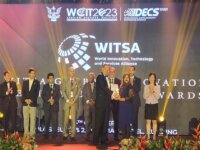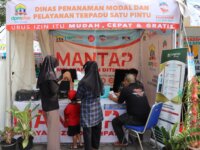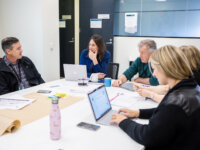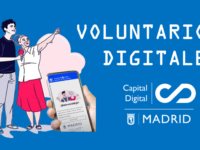The Conectando Saberes ('Connecting Knowledge') Academy of the Specialised Protection Service for Children and Adolescents presents a novel way of training people who intervene directly in the protection of the rights of children and adolescents using a digital platform. The design was co-creative, taking into account the vision and experience of those who are in direct contact with children and their families.
Innovation Tag: Social Innovation
"Påkobla Hjelpemiddel" (PH) is a digital solution developed from a digitalization department in Kristiansund Municipality, Norway. This innovative system addresses challenges in inventory, distribution, and logistics, improving the efficiency of delivering assistive devices. PH will be completed as a system in the end of 2024, but is today used by four municipalities that are a part of the innovation.
In response to the universal issue of a demand-supply gap in the labor market in Bangladesh, the Aspire to Innovate (a2i) Program has launched National Intelligence for Skills, Education, Employment, and Entrepreneurship (NISE). The innovation seeks to utilise data to help those who wish to enter the job market make informed decisions. It is a pioneering approach that ensures collaboration between government ministries and skills service providers under one umbrella to remove unemployment.
Good Coffee is a Vocational Engagement Enterprise that organises a chain of social cafes for people with complex psychosocial disabilities. The cafes provide vocational rehabilitation on a work place and for some, introductory training is already given during their hospitalization in Mental Health Centers. The model enables continuity of care and transition between the realms of Health, Social Services and Employment. Good Coffee also reduces public funding, increases independent living and…
The investment and business sector in Serang City, especially for small-scale, is still facing licensing constraints. Easy Business License in One Step, comes as solution that allows business licensing and education services to the community, will be conducted at the village and sub-district, instead of having to go to the Investment and One-Stop Office. It will cut bureaucratic red tape so that people with time constraints, lack of understanding, and people with disabilities can be served.
The Small Business Development Corporation (SBDC) has embraced human-centred design to transform the way regulation is developed and applied for small businesses in Western Australia. The SBDC partnered with 22 local governments to deliver the Small Business Friendly Approvals Program, which involved reviewing the approvals journey from the small business’ perspective and designing reforms to streamline processes. The Program has ignited transformational change and made it easier to do…
To tackle air pollution and climate-related challenges, Milan has devised and executed a groundbreaking initiative to engage citizens in sustainability planning – the Permanent Citizens' Assembly on Climate. By fostering inclusive deliberations, the Assembly puts forth tangible recommendations for the city's long term sustainable development agenda. Its innovative model guides an equitable transition that positively impacts all residents ensuring durable civic participation in policymaking.
Santo Stefano di Sessanio is a rural village affected by long-standing depopulation and marginalisation phenomena that need to be effectively tackled. Seizing the opportunity of funds for socio-economic revitalisation, a participatory process was promoted to identify a framework of proposals responding to real local needs and aimed at improving the attractiveness and liveability of the village, while strengthening the local community's sense of trust, spirit of cooperation and responsibility.
DCCEEW partnered with the CSIRO to develop a novel approach to track social licence for the energy transition. A valid and reliable survey instrument was designed and deployed to measure Australian attitudes and behavioural intentions towards the energy transition. As the energy transition has been met with concern from communities, results from this survey are key to developing evidence-base policy, and to bassline and track social licence to ensure a speedy and just energy transition.
Digital Training for All ensures and monitors the continuous progress in digital skills to promote the digital training of citizens by integrating and enhancing the city's public-private strengths. To this end, a dynamic alliance will be created to stimulate the city's digital skills ecosystem, bringing it closer to the public. Among its initiatives, Digital Volunteering is already a reality, a digital accompaniment project for the elderly population to mitigate loneliness and reduce the digital…





